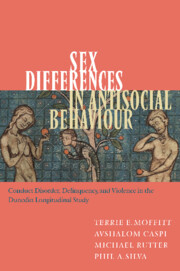 Sex Differences in Antisocial Behaviour
Sex Differences in Antisocial Behaviour Published online by Cambridge University Press: 22 September 2009
In the previous two chapters we examined sex differences in the early risk predictors for antisocial behaviour. We continue this theme in this chapter by turning our attention to sex differences in the relation between personality and antisocial behaviour. A personality analysis of sex differences in antisocial behaviour may improve our understanding of the diathesis underlying antisocial disorders. Personality research has already described the nature of the propensity toward antisocial behaviour by organizing information about the individual differences in cognitions, motivations, emotions, and distinct styles of approach and response to the world that robustly predict criminal offending (Moffitt et al., 1995). Just as males and females differ on their antisocial involvement on average (chapters 3 and 4), males and females are also known to differ on their personalities on average (Feingold, 1994). If population sex differences in personality traits could account for the sex difference in antisocial behaviour this conjunction would suggest that measured quantitative personality traits may be a window on to core diatheses underlying antisocial disorders. Such a window could deepen our understanding of antisocial propensity because findings about the origins of personality traits are rapidly emerging from several quarters in the behavioural sciences. Longitudinal studies attest to developmental links from early childhood temperament to later adult personality (Caspi, 2000; Caspi et al., forthcoming).
To save this book to your Kindle, first ensure [email protected] is added to your Approved Personal Document E-mail List under your Personal Document Settings on the Manage Your Content and Devices page of your Amazon account. Then enter the ‘name’ part of your Kindle email address below. Find out more about saving to your Kindle.
Note you can select to save to either the @free.kindle.com or @kindle.com variations. ‘@free.kindle.com’ emails are free but can only be saved to your device when it is connected to wi-fi. ‘@kindle.com’ emails can be delivered even when you are not connected to wi-fi, but note that service fees apply.
Find out more about the Kindle Personal Document Service.
To save content items to your account, please confirm that you agree to abide by our usage policies. If this is the first time you use this feature, you will be asked to authorise Cambridge Core to connect with your account. Find out more about saving content to Dropbox.
To save content items to your account, please confirm that you agree to abide by our usage policies. If this is the first time you use this feature, you will be asked to authorise Cambridge Core to connect with your account. Find out more about saving content to Google Drive.